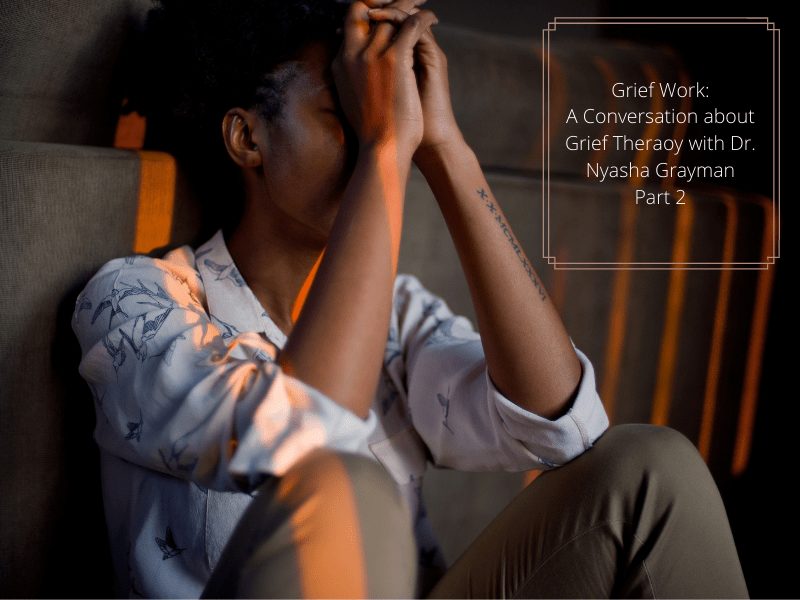Grief Work: A conversation about Grief Therapy with Dr. Nyasha Grayman (Part 2)
MommiNation continues its conversation with grief and bereavement therapist Dr. Nyasha Grayman.
MommiNation: How, if at all, has the Superwoman image of Black women affected the way therapists work with Black women?
Dr. G.: As a profession psychology has picked up this idea that we don’t hurt in the same way that other people do. I think that its only recently that it is becoming much more common for us to talk about this suffering and this long-standing historical harm as trauma. And trauma impacts your nervous system. There’s certain wiring we all have. I have a nervous system. I have a heart. I have a digestive system. It’s almost revolutionary and radical to actually say that out loud. Like, you know, Black women have nervous systems that get damaged by trauma.
MommiNation: How do grief and pain and loss show up in the body?
Dr. Grayman: I think that it’s helpful to think about the primitive organ systems and the order in which they develop in a fetus. I think of it in this way when I’m working with people because it helps me to think about why I privilege body-work before talk therapy and cognitive work. It’s valuable to me to think of the women that I work with as having a heart intelligence, a digestive intelligence, and a brain intelligence. And, I try to work in that order. So, we’re going to do talk therapy, but the work is probably going to start with heart-centered energetic interventions. This sounds very big and fancy, but it’s something as simple as rubbing your hands together to create the friction and heat and then having the person put their hands over their heart while they’re doing deep breathing. We may start there before we get into how your day was. Sleep hygiene is also really a big part of the work that I do, Because the sleep helps with digestive health. Same with the breathing. Breath work is integrated every step along the way. Mindful eating and hydration are also part of what we do at the front end of our work together.
MommiNation: What do you want women to understand about the stages and the journey of coping with grief and loss?
Dr. Grayman: It’s important to note that Elizabeth Kübler-Ross, who gave us the stages of grief, was very clear that these stages were not linear, and also that she was putting forth her experience of the process of dying, not the experience of grief after the death of a loved one. So, it is very important for us to honor her intellectual work and contribution and where she meant to sit and where she did not. The stages of grief are often shared with people after they’ve lost a loved one, but they’re not really intended for that. That said, as part of your grief journey you are likely to experience the shock, the denial, anger, trying to bargain. You may be experiencing all of those things at the same time or at different times. Then we have what we call grief bursts where out of nowhere you just get a surge of grief response, or a grief wave which would be a long, sustained grief burst. Grief doesn’t necessarily happen in a stage-like manner. There’s no destination. There is no way of grieving correctly and no way to say you’ve reached the end of grief. So, I would say take that information and just be very compassionate with yourself.
MommiNation: We often think about grief as an individual experience rather than as a shared experience. How does grief go beyond the individual?
Dr. Grayman: Although I work with individuals only, I’m a systems thinker, and part of being a systems thinker involves the idea that changing one part of a system changes the whole system. So, when I’m working with one individual I’m conceptualizing that I’m working with an entire community and even an entire culture in that room. People say for every death, you should think that a minimum of 100 people are impacted. I think about how the work that I do with adults impacts how they’re able to model and support the children in their life who may be grieving. I think in terms of a whole system. The science supports it.
MommiNation: What do you see as the focus of grief work?
Dr. Grayman: We’ve got to learn to read our own energy and honor that. The question for Black women is how do you do that in a world that doesn’t typically honor your pain? For me part of the work of grief is learning how to become literate about our pain. A big part of my work with clients is helping them to develop their intuition, and their interoception—which is their understanding of what is going on inside of themselves. Their own wisdom. Having someone help you is useful because you have a mirror who says, “Wow, I noticed when you said this, you did a deep sigh, or your shoulders are hunched up. Did you notice that?” So, we’re going to work on you noticing that so that you’re developing your own interoception. It’s helpful to have someone working with you to do that.
MommiNation: If I’m a black woman who has been dealing with trauma, loss, and grief, and I’m looking for a therapist, how do I go about finding one?
Dr. Grayman: I would recommend starting with the Therapy for Black Girls directory. That directory now has 4,000 providers across the country listed, and you can search by your location, virtual or in-person. Beyond that I think you need to really look at a therapist’s website. There’s a lot that you can pick up about someone from their website from what they say and what they don’t say, and how they say the things they say. And, it helps if the site includes information where you can see the person interacting in public spaces. For example, my website includes a podcast interview that I did on Shapes of Grief, where I talk about my own experience of traumatic loss. That gives people an opportunity to hear me in another space. I actually comb podcasts that are therapy podcasts or grief podcasts.
MommiNation: How do we know when it’s time to reach out to a counselor?
Dr. Grayman: I would say for sure it’s time to reach out if you’re having suicidal thoughts, thoughts of death by suicide. If you are having a lot of trouble sleeping, because sleep difficulties are a gateway to a whole host of problems including suicidal ideation. It can exacerbate those kinds of thoughts. So, if you’re having trouble sleeping, if you find yourself feeling terrorized, like highly frightened, and nervous and jumpy. And then, of course, if you’re having flashbacks, and a lot of nightmares, which relates to sleep. Those, I would say, are some of the indicators that you should reach out to a grief therapist in particular.
Here I want to make a distinction between a therapist, a counselor, and a coach, a counselor and a coach. A coach is not a licensed clinician, so they can’t diagnose and you can’t use insurance for that. And they can’t do the collaboration for a psychotropic medication or anything like that. But they’re good sources of support. Counselors can do the diagnosis. But, I would say if you are experiencing reactions like sleeplessness, anxiety, fear, and suicidal thoughts it’s time to reach out to someone like myself, who really works with traumatic grief reactions and responses.
Bio: Dr. Nasha Grayman is owner and operator of Wisdom Counseling, Baltimore LLC, which is a boutique grief and bereavement therapy practice in Baltimore County, MD. Dr. Grayman is also an Endowed Professor and an Associate Professor of Psychology and Africana Studies at a Baltimore area liberal arts college.
Links referenced:
Stages of grief: https://www.ncbi.nlm.nih.gov/books/NBK507885/
Therapy for Black Girls: https://therapyforblackgirls.com/
Dr. Grayman’s Wisdom Counseling, https://www.wisdomcounseling-baltimorellc.com/about-dr-nyasha-grayman/
Dr. Grayman’s “Shapes of Grief” podcast: https://www.youtube.com/watch?v=qcParqGl_ys
Mommination encourages you to use the links listed above by Dr. Grayman if you are experiencing any difficulties during your time of grieving.








Leave a Reply